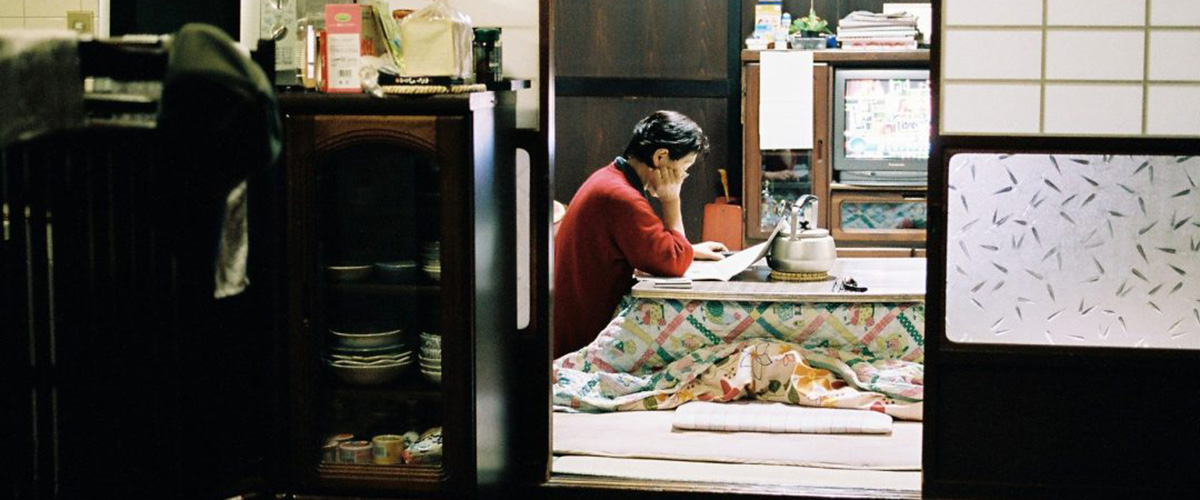“It’s sad to get old in any period.” Tayoko (Tayoko Shiojiri) has just watched Yasujirō Ozu’s Tokyo Story on television and it’s struck a nerve of melancholy. The Japanese master’s great films tend to do this to viewers, especially those who find themselves in the midst of painful transition. Her husband Junji (Kaoru Iwahana) has become increasingly ill over the last few months, and the slow passage of time has suddenly taken a different meaning for the woman who spends so many hours outside in the fields cultivating crops.
This observation about aging comes in one of many journal entries that comprise the spine of The Works and Days (of Tayoko Shiojiri in the Shiotani Basin), an experimental study in duration and devotion that intricately overlaps voiceover and ambient sound design to create a symphonic cinematic space in the quietest of locations. If the incessant trilling of insects, bird calls, and falling raindrops suggests a world brimming with life, it’s always juxtaposed with the quiet, creeping inevitability of death. Due to her husband’s worsening condition and feelings of helplessness, Tayoko experiences many periods of sorrow that she mostly internalizes, save the rare reflective moment.
C.W. Winter and Anders Edström’s patience-testing, masterful 480-minute narrative was reportedly shot over the course of 27 weeks (in a 14-month period) with the 47 inhabitants of Shiotani Basin, a mountainous prefecture of Kyoto where one can easily get lost on daylong walks. Always rooted to a tripod, their camera nevertheless explores every inch of the country terrain through Wiseman-esque post-up-and-shoot montages, covering the trails and swimming holes where Tayoko spends time with grandchildren who often visit during vacation months.
While The Works and Days stays mostly tethered to Tayoko’s daily routine (weeding, harvesting daikon, delivering vegetables to neighbors), it often listens in on conversations shared between many friends during nighttime gatherings. The most memorable is a retiree, Hiroharu (Hiroharu Shikata), whose lively stories tend to become even more emotional after multiple rounds of Japanese whiskey and beer. Often rambling and longwinded, each of his monologues provide necessary context to the film’s larger examination of the way experience and narrative shape perspective.
Considering its staggering length, The Works and Days gives viewers plenty of time to consider this and other through lines in great detail. The one I kept thinking about was the sobering motif of maintenance. Much of Winter and Edström’s direction focuses on how individuals, families, and communities try to preserve social and interpersonal relationships, cultural traditions, signifiers of national pride, and even the natural landscapes and manmade structures in which they live.
We’ve all been afflicted with Ostrich syndrome at some point, getting stuck in a groove of work that can deny the realities of impending change. Tayoko’s emblemizes this rigorous dedication to perpetuating cycles that are entirely humane and never self-serving, but also function as a means of distraction in order to cope with trauma. She stoically tends to Jinju in much the same way as a field that needs plowing. But in Works‘ greatest sequence, where Tayoko and her husband visit Tenryū-ji temple in order to pay their respects, she begins to open up about their past life together, being a young married couple, and the anger that has been buried for so long. It’s a conversation of great vulnerability and honesty that is unforgettable.
Tayoko never has another opportunity to speak freely with her husband, and by the final hour we see the massive toll that lack of expression has had on her as a person. Yet in many ways the film honors her complicated bereavement process by connecting it back visually and sonically with seasonal landscapes that are experiencing their own cycles of rebirth. They are neighbors in all things, including change. The Works and Days is by no means an easy thing to endure, but doing so brings you closer to understanding what it might mean to finally be at peace.
The Works and Days comes to Film at Lincoln Center on Friday, July 16.

